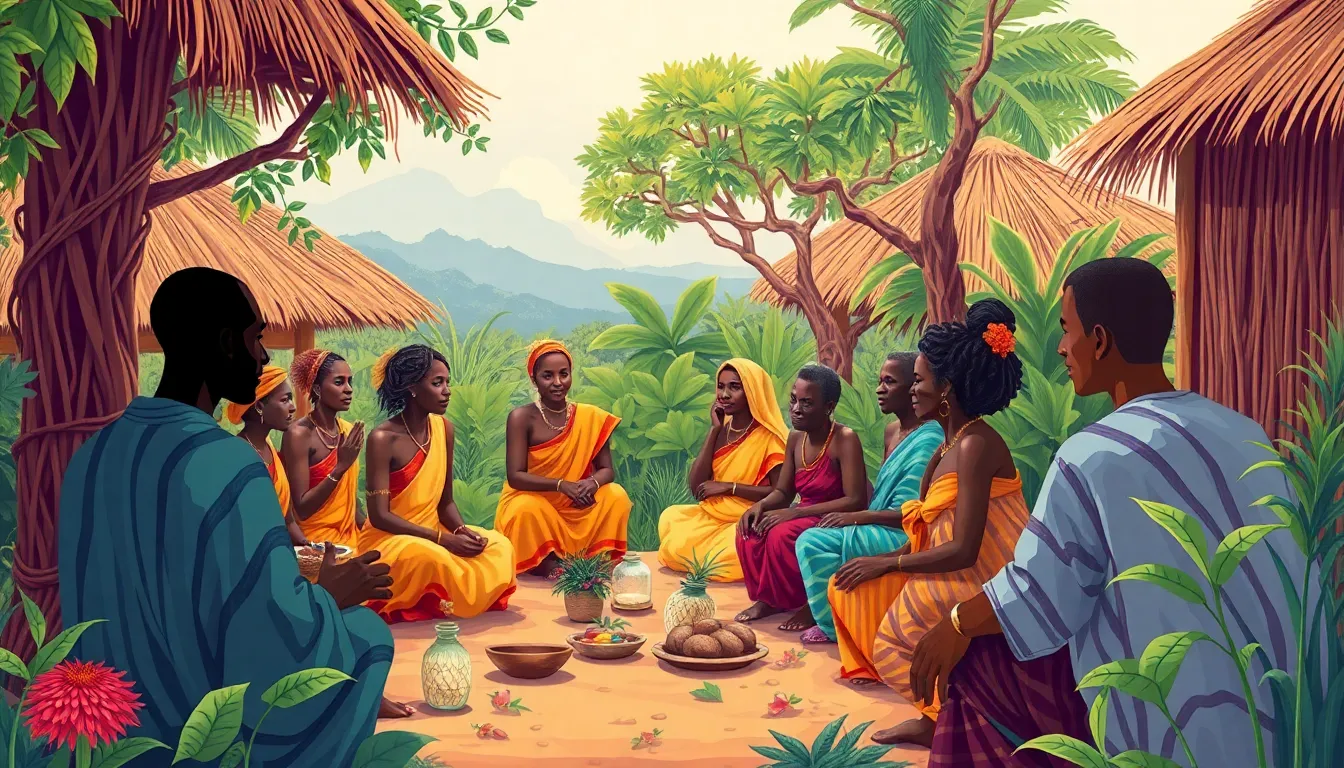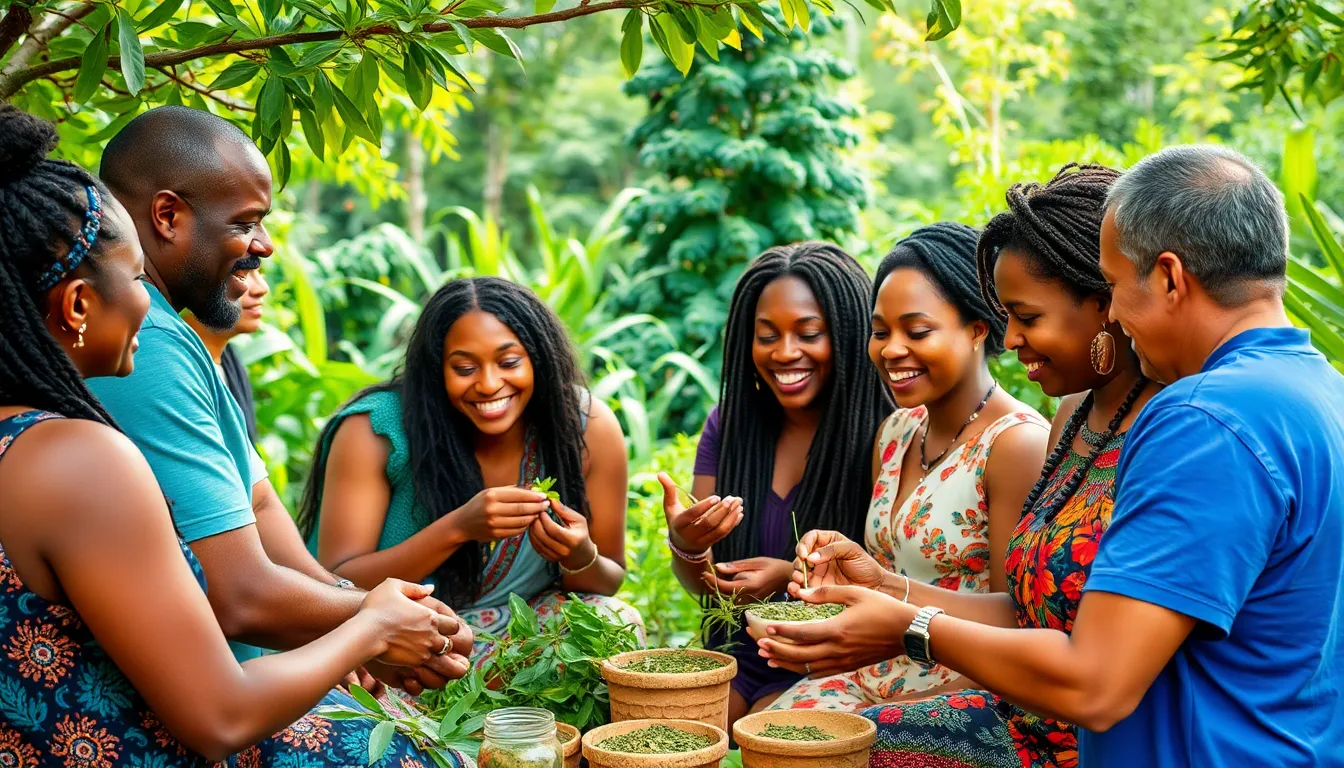Imagine a world where health isn’t just about popping pills or counting calories. Welcome to the vibrant realm of African holistic health, where wellness is a dance of mind, body, and spirit. This ancient approach embraces natural remedies, traditional practices, and the belief that true health goes beyond the physical.
From herbal teas that could make even the grumpiest person smile to rituals that connect individuals with their roots, African holistic health offers a refreshing twist on modern wellness. It’s not just a trend; it’s a lifestyle that encourages balance, harmony, and a sprinkle of joy. So, if you’re ready to swap your gym membership for a journey into the heart of wellness, buckle up! Let’s explore how tapping into these age-old practices can transform not just your health but your entire outlook on life.
African Holistic Health
African holistic health emphasizes a comprehensive approach to wellness that integrates the mind, body, and spirit. This philosophy recognizes that health extends beyond physical symptoms to encompass emotional and spiritual well-being.
Definition and Principles
African holistic health refers to a balanced lifestyle incorporating various elements of traditional therapy, preventative measures, and natural remedies. Key principles include harmony with nature, respect for ancestral knowledge, and the promotion of community involvement. Together, these principles foster a deep connection to one’s cultural heritage and environment. The approach encourages individuals to seek wellness through practices such as herbal treatments, meditation, and rituals that honor family and community ties.
Cultural Significance
Cultural significance plays a pivotal role in African holistic health. Many communities view health as a communal experience rather than an individual pursuit. Practices are often rooted in ancestral traditions and passed down through generations. Relying on herbal medicine and spiritual guidance, practitioners address the physical, emotional, and spiritual aspects of health. Celebrating life events through rituals strengthens social bonds and reinforces community support. Emphasizing a collective responsibility for each other’s well-being, this perspective nurtures a culture of care and interconnectedness.
Components of African Holistic Health

African holistic health emphasizes a comprehensive approach, focusing on both physical and emotional well-being. Practitioners utilize interconnected methods to promote overall wellness.
Physical Well-being
Physical health forms the foundation of African holistic health. It encompasses preventive measures such as regular exercise, a balanced diet rich in local fruits and vegetables, and the use of herbal remedies. Traditional African medicine incorporates natural plants, roots, and herbs to treat various ailments effectively. Emphasis on maintaining a strong connection with the environment supports physical vitality. Healthy community practices, such as communal farming and traditional healing rituals, foster a deep sense of belonging and encourage active lifestyles.
Emotional and Spiritual Balance
Emotional and spiritual balance plays a critical role in overall health. African holistic health emphasizes the importance of mental well-being, often achieved through community support and guidance from elder members. Rituals and ceremonies strengthen spiritual connections and provide emotional healing. Practitioners believe in the unity of body and spirit, promoting practices that nurture the soul. Advocacy for meditation and mindfulness practices enriches emotional resilience, aiding individuals in navigating life’s challenges. Maintaining this balance enhances happiness and contributes to a harmonious life.
Traditional Practices in African Holistic Health
This section explores the foundational traditional practices integral to African holistic health, emphasizing herbal remedies and spiritual healing techniques.
Herbal Remedies
Herbal remedies play a crucial role in African holistic health. These natural treatments utilize local plants and herbs for various ailments. Specific herbs, like moringa and ginger, possess significant healing properties, benefiting both physical and mental health. Practitioners often prepare traditional teas or tinctures, targeting conditions such as high blood pressure and respiratory issues. The rich knowledge of herbalism is typically passed down through generations, ensuring respect for ancestral wisdom. Community gatherings often involve sharing herbal recipes, fostering a collaborative approach to healing. People frequently seek out local healers for expertise, reinforcing trust within their communities.
Spiritual Healing Techniques
Spiritual healing techniques offer profound insights into the interconnectedness of mind, body, and spirit in African holistic health. Rituals, such as drumming, dancing, and prayer, create communal bonds while fostering spiritual alignment. Traditional healers integrate these practices to enhance physical recovery through emotional support. Ancestor veneration is common, allowing individuals to seek guidance from those who came before them. Dream interpretation also plays an essential role, guiding personal growth and decision-making. Community gatherings often include these spiritual practices, deepening connections among individuals. Empowerment through spirituality cultivates resilience, promoting a balanced and fulfilling life.
Modern Integration of African Holistic Health
African holistic health increasingly merges with modern practices, creating a comprehensive approach to well-being. This integration fosters a more inclusive understanding of health that values both traditional wisdom and contemporary medicine.
Fusion with Conventional Medicine
Several healthcare practitioners embrace African holistic health principles within conventional settings. Integrating these approaches often enhances patient outcomes, as it addresses physical, emotional, and spiritual needs collectively. Examples include combining herbal remedies with prescribed medications to improve effectiveness. Patients benefit from tailored treatments designed to optimize wellness while respecting their cultural backgrounds. Many clinics now offer holistic programs that incorporate traditional healing methods alongside modern therapies, creating an environment that nurtures diverse healing practices.
Growing Global Interest
Global interest in African holistic health is on the rise, driven by increasing awareness of alternative wellness practices. Individuals seek natural remedies as they become more cautious about synthetic medicines and their side effects. Social media platforms facilitate the sharing of practices like herbal medicine and spiritual healing across borders. Workshops and seminars showcasing these traditions attract participants eager to learn and incorporate holistic approaches into their lives. The growing popularity not only celebrates cultural heritage but enhances the global health dialogue, promoting a broader understanding of wellness that aligns with various lifestyles.
Conclusion
Embracing African holistic health offers a transformative approach to well-being that resonates deeply with cultural heritage. By integrating mind, body, and spirit, individuals can cultivate a lifestyle rooted in balance and harmony. The revival of traditional practices and natural remedies not only enhances personal health but also strengthens community bonds.
As awareness of these principles grows, more people are discovering the value of holistic methods alongside modern healthcare. This fusion of ancient wisdom and contemporary practices paves the way for a comprehensive understanding of health that nurtures both individual and communal wellness. In this journey towards a healthier life, the teachings of African holistic health provide invaluable insights for those seeking lasting joy and fulfillment.

